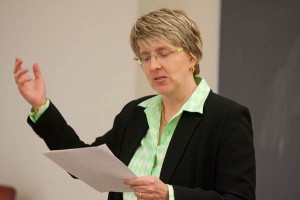By Aaron Creuz
Correspondent

It was a packed room at the politics forum on Thursday March 18 on God, gay rights and marriage. Women and gender studies assistant professor Michelle Stecker explained the turnout.
“If you put God and (LGBT) together, you’re always going to have an audience.”
Stecker is an ordained Presbyterian minister, attorney, professor and she is also a homosexual. To initiate discussion amongst the room’s many occupants, Stecker distributed a sheet of six scenarios to analyze, each involving a complex legal issue involving gay, lesbian and transgender relationships.
Stecker also provided a map detailing the legal status afforded to same sex couples in different states across America. What would happen if a man’s domestic partner died in Ohio without specifically including him in his will as the heir to the home they shared for years? Would the transgender woman from Texas have the right to sue the doctor whose neglect led to her husband’s death in a state which would not legally recognize their union?
Though Stecker provided explanations to what the outcome would likely be to each of the scenarios, she informed the audience that many of the laws associated with such cases were often loosely written.
“No one really knows what a civil union is. What do we even call ourselves?” she said.
In a country divided over the issue, one couple’s rights can be voided once they cross a state line. Stecker pointed out how federal legislation under the Defense of Marriage Act allowed for such divisions to occur when it gave states the right to ignore marriages legally sanctioned elsewhere. The law also deprived homosexual unions of the 1,138 federal rights afforded to heterosexual marriages.
Many Americans feel that homosexual unions should be illegal on religious grounds, citing their belief that the Bible and other religious works clearly list such acts as sinful. However, Stecker took an opposite approach. Through her studying of the Bible as a minister, she came across numerous passages that encouraged marriage in various forms other than between a single man and woman. Such passages talked of religious figures of the past endorsing polygamy, incest, rape and extramarital affairs. In response, she restated her belief that marriage is not an issue of religion.
“Marriage is a civil contract, part of secular law. If a Church wants to attach blessings to it then that’s fine but bottom line, it’s the law,” she said.
Stecker stressed how it is impacting American citizens personally involved with the struggle. Same — sex spouses are often not allowed to visit their partner in the hospital if an emergency situation arises.
Stecker also said it is the young children of these unions who feel the hardship involved in situations who they feel inhibit their rights.
“We’re beginning to see a lot of court cases brought forth by children because there is a prevalent social stigma placed on unmarried parents in the eyes of their kids,” she said.
Interest groups around the country continue to grow each day both for and against homosexual marriage and the rights which would follow, Stecker said. Some states have taken the initiative to guarantee that these rights be provided for while other states have taken the opposite approach. Stecker encouraged them to “pick up a history book or study their Bible more closely.”






